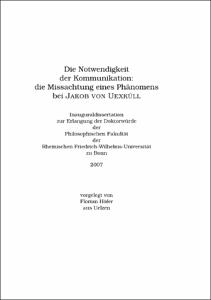Die Notwendigkeit der Kommunikationdie Missachtung eines Phänomens bei Jakob von Uexküll

Die Notwendigkeit der Kommunikation
die Missachtung eines Phänomens bei Jakob von Uexküll

| dc.contributor.advisor | Lenders, Winfried | |
| dc.contributor.author | Höfer, Florian | |
| dc.date.accessioned | 2020-04-09T10:08:02Z | |
| dc.date.available | 2020-04-09T10:08:02Z | |
| dc.date.issued | 2007 | |
| dc.identifier.uri | https://hdl.handle.net/20.500.11811/2762 | |
| dc.description.abstract | Ziel der Arbeit war es, die Schriften von Jakob von Uexküll (1864–1944) daraufhin zu untersuchen, ob sie für Kommunikationstheorien relevante Aussagen enthalten. Die Begriffe und Thesen Uexkülls wurden herausgearbeitet und in Bezug auf Aussagen bewertet, die für eine Kommunikationstheorie zu fordern sind. Dabei wurde von der These ausgegangen, dass Kommunikation in Bezug auf die Entwicklung von Lebewesen als notwendiges Phänomen angesehen werden muss. Die Arbeit bestand darin, Invarianten aus einer sehr variierenden inhaltlichen Aussagequalität – bis zur Inkongruenz – herauszuarbeiten, und dies über einen Zeitraum, der auch die frühen Schriften und nicht nur das viel beachtete Hauptwerk umfasst. Als Ergebnis wird festgehalten, dass die Notwendigkeit der Kommunikation in den Schriften Uexkülls nicht erkennbar ist. Uexkülls Thesen sind streng dualistisch. Er argumentiert mit der Vorstellung einer höheren Planung und benötigt kommunikative Prozesse deshalb nicht für seine Erklärungen. Auf dem Gebiet der Entwicklung macht er Aussagen, die Kompatibilität zum Kreationismus aufweisen. Seine Subsumtion der Kantischen Paradigmen unter seine Vorstellung von Biologie ist mit der Logik und der Argumentation Kants nicht vereinbar. Darüber hinaus wird in den Schriften Uexkülls eine starke empiristische und naturalistische Tendenz erkennbar. Ein komplexer Umweltbegriff ist abgeleitet aus sehr einfachen Untersuchungen der Sinnesorgane der Tiere, deren Relevanz nicht belegt wurde. Uexküll entwickelt ein Modell, das er als „Funktionskreis“ bezeichnet, das sowohl kybernetisch als auch erkenntnistheoretisch gedeutet werden kann. Aus heutiger Sicht sind die kybernetisch-maschinentheoretische Modellierung und die handlungstheoretische Beschreibung derartig miteinander vermischt, dass sie zumindest für eine Kommunikationstheorie nicht verwendbar erscheinen. | en |
| dc.description.abstract | The necessity for communication - Jakob von Uexküll’s disregard for a phenomenon The aim of this project was to examine the works of Jakob von Uexküll (1864–1944) with a view to determining whether they contain statements relevant to communication theory. Uexküll’s concepts and arguments were extracted from the texts and analysed in the light of statements essential to a theory of communication. The analysis was grounded in the assumption that communication must be regarded as an indispensable phenomenon in the development and evolution of living beings. As an initial step, invariables were extracted from Uexküll’s many statements – varying in content terms to the point of incongruence – taken from a period which includes also his early articles and not only his well-known main work. Subsequent analysis of those invariables reveals that necessity for communication can not be detected in the works of Jakob von Uexküll. His arguments are strictly dualistic. His reasoning is premised on the concept of a superior order and communication processes are accordingly unnecessary in the development of his theories. His statements in the field of evolution may be regarded as compatible with creationism. His appropriation of Kantian paradigms in the construction of biological concepts is incapable of being reconciled with Kant’s own logic and argumentation. Moreover, Uexküll’s works reveal pronounced empiristic and naturalistic tendencies. His complex notion of Umwelt (in the sense of a “surrounding world”, that is say Uexküll’s approach to sensory perception) is derived from very basic experiments on the sensory organs of animals without even furnishing proof of their relevance to his theory. Uexküll develops a model which he labels a Funktionskreis (“functional circuit”) capable both of cybernetic and epistemological interpretation. From today’s perspective, the cybernetic modelling and the descriptive elements concerning action theory are so heavily intertwined as to be of no assistance in the development – at the very least – of communication theory. | en |
| dc.language.iso | deu | |
| dc.rights | In Copyright | |
| dc.rights.uri | http://rightsstatements.org/vocab/InC/1.0/ | |
| dc.subject | Dualismus | |
| dc.subject | Umwelt | |
| dc.subject | Sinneswahrnehmung | |
| dc.subject | Evolution | |
| dc.subject | Kreationismus | |
| dc.subject | Kommunikationstheorie | |
| dc.subject | dualism | |
| dc.subject | environment | |
| dc.subject | sensory perception | |
| dc.subject | creationism | |
| dc.subject | communication theory | |
| dc.subject.ddc | 300 Sozialwissenschaften, Soziologie, Anthropologie | |
| dc.title | Die Notwendigkeit der Kommunikation | |
| dc.title.alternative | die Missachtung eines Phänomens bei Jakob von Uexküll | |
| dc.type | Dissertation oder Habilitation | |
| dc.publisher.name | Universitäts- und Landesbibliothek Bonn | |
| dc.publisher.location | Bonn | |
| dc.rights.accessRights | openAccess | |
| dc.identifier.urn | https://nbn-resolving.org/urn:nbn:de:hbz:5-11542 | |
| ulbbn.pubtype | Erstveröffentlichung | |
| ulbbnediss.affiliation.name | Rheinische Friedrich-Wilhelms-Universität Bonn | |
| ulbbnediss.affiliation.location | Bonn | |
| ulbbnediss.thesis.level | Dissertation | |
| ulbbnediss.dissID | 1154 | |
| ulbbnediss.date.accepted | 16.05.2007 | |
| ulbbnediss.fakultaet | Philosophische Fakultät | |
| dc.contributor.coReferee | Bartels, Andreas |
Dateien zu dieser Ressource
Das Dokument erscheint in:
-
E-Dissertationen (713)




